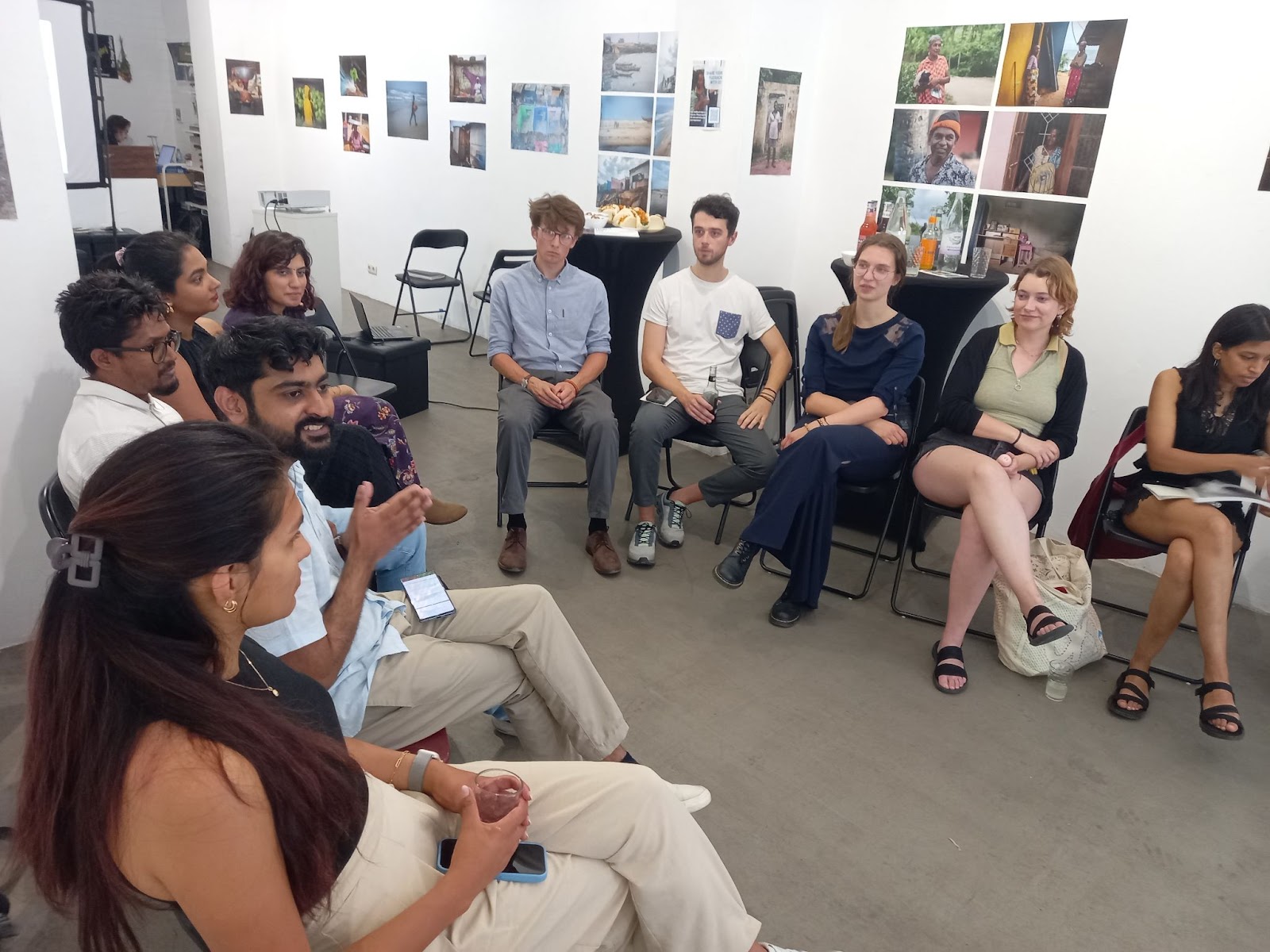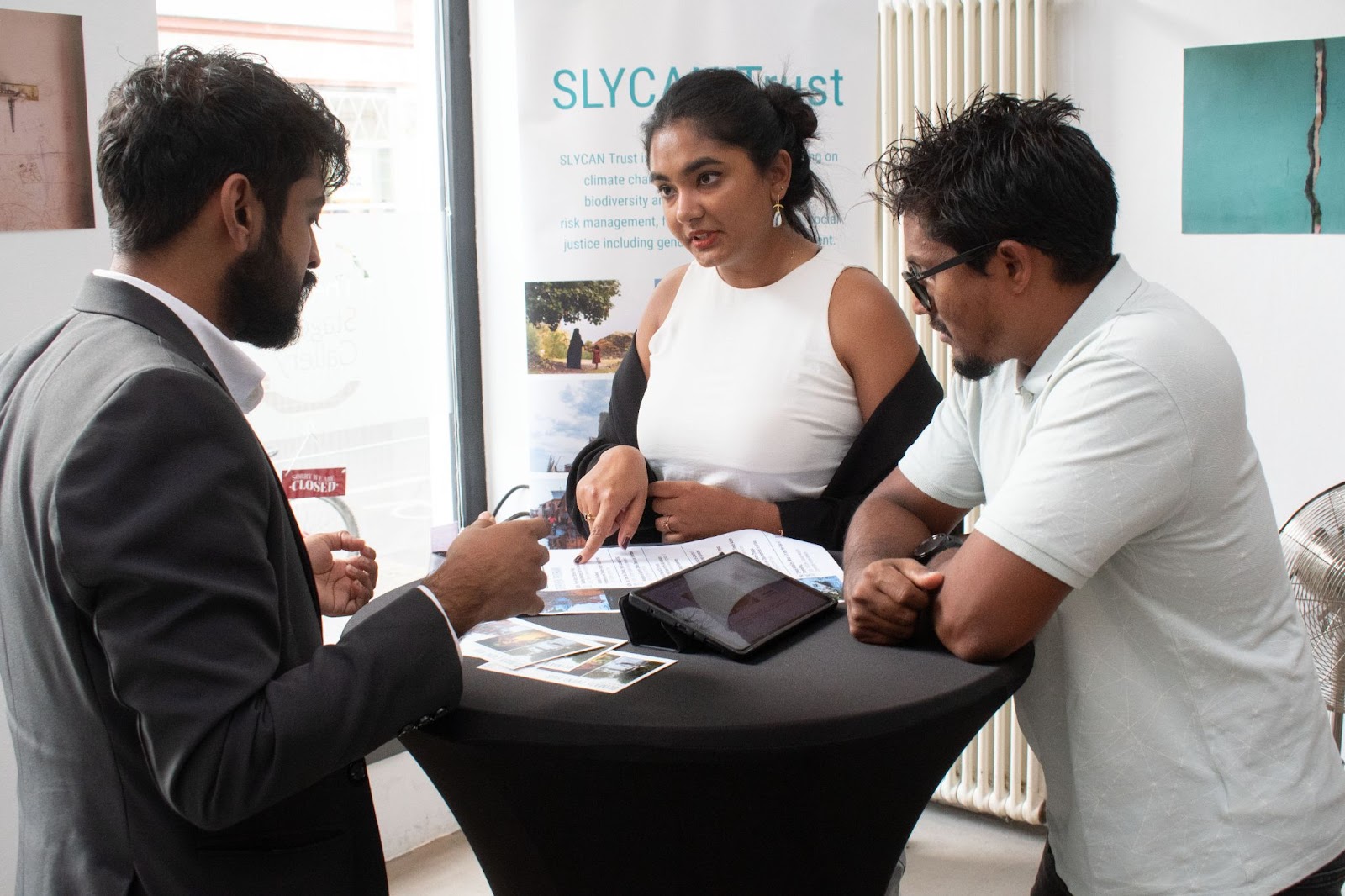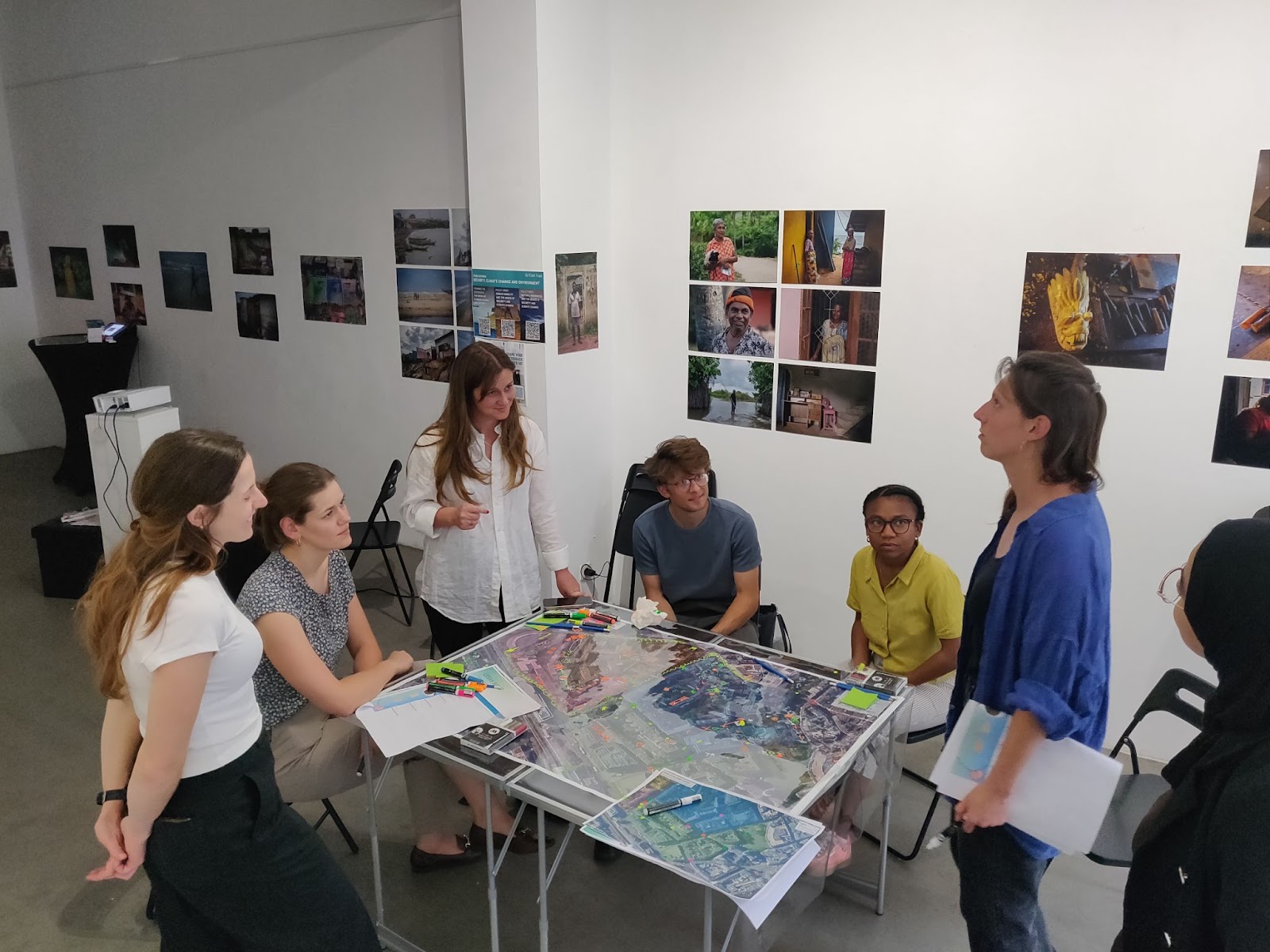The climate crisis — along with the broader triple planetary crisis of climate change, pollution, and biodiversity loss — is a whole-of-society challenge that requires urgent, multi-stakeholder-driven action. To facilitate a broad dialogue with a wide variety of actors, SLYCAN Trust hosted an innovative Climate Event Hub on the sidelines of the UNFCCC June Climate Meetings (SB62) in Bonn, Germany.
The Climate Event Hub provided an opportunity for policymakers, researchers, practitioners, civil society, UN agencies, youth, and the broader public to step away from the negotiations and engage with a diverse range of perspectives on climate change and related environmental issues. Throughout the week, various organizations hosted events at a unique creative space at The Stage Gallery, providing a platform for collaboration and the exchange of ideas against the backdrop of our photography exhibition, “On the Frontlines: Climate-Induced Loss and Damage across Asia, Africa, and Latin America.” The Climate Event Hub successfully operated from June 22nd to 26th and saw active engagement, with highlights including a Climate 2.0 dialogue, a reception on security and climate change, and a reception on the climate-health nexus.
The Climate 2.0 dialogue, “Rooted in Resilience: Perspectives on Climate-Friendly Food Systems,” featured a productive and insightful discussion that explored commonalities among stakeholders from diverse countries and backgrounds, as well as the challenges associated with intervening in unsustainable systems while respecting individuals' right to make informed consumer choices.

On June 23rd, a reception brought together 45 experts and policymakers for an open discussion around SLYCAN Trust’s work programme on security, environment, and climate change, as well as the broader security-climate nexus. It offered the opportunity for us to continue our scoping of this crucial thematic nexus, engage with diverse and expert voices, and to share our recent knowledge products on human mobility and natural resources within the security-climate nexus.
The nexus of health and climate change was the focus of another reception on June 25th, attended by 55 participants. Esther Mireku, a programme and research associate working with SLYCAN Trust and the government of Ghana, highlighted the mental health impacts of climate-related loss and damage, drawing on the human stories captured in the photography exhibition. The health and climate nexus calls for human-centric approaches, as well as the need to recognise the connected challenges to governance systems and public services threatened by environmental changes.
From the photography exhibition, our inclusive climate dialogues and receptions on key research areas, the week at the Stage Gallery showcased the entire range of SLYCAN Trust’s activities, originating from Sri Lanka, to Asia, Africa, Latin America to Bonn, engaging with experts, policymakers, civil society and youth leaders in the multilateral frameworks and processes.

Throughout the week, SLYCAN Trust also provided a platform for third-party organizations to host their events. Colleagues and like-minded organizations, ranging from think tanks to youth groups, took up the offer, and the Climate Event Hub hosted discussions on a wide range of interdisciplinary topics, from sensory approaches to urban planning and environmental education in Egypt. Throughout the week, our guests gave their own perspective and background on our shared challenges.

With the conclusion of the June Climate Meetings and our Climate Event Hub, we’d like to thank everyone who attended, and particularly those who collaborated with us to host their events. As the UNFCCC prepares for COP 30 in Belem, we hope that integrated understandings from diverse perspectives are incorporated into the negotiations and climate action. It is vital that proposed solutions incorporate the interconnections and synergies between environmental and social problems, and that the focus for action remains concentrated on vulnerable populations, who are most likely to experience the compounding effects of loss and damage, as well as the need for adaptation.
SLYCAN Trust is a non-profit think tank. It has been a registered legal entity in the form of a trust since 2016, and a guarantee limited company since 2019. The entities focus on the thematic areas of climate change, adaptation and resilience, sustainable development, environmental conservation and restoration, social justice, and animal welfare. SLYCAN Trust’s activities include legal and policy research, education and awareness creation, capacity building and training, and implementation of ground level action. SLYCAN Trust aims to facilitate and contribute to multi-stakeholder driven, inclusive and participatory actions for a sustainable and resilient future for all.
The climate crisis — along with the broader triple planetary crisis of climate change, pollution, and biodiversity loss — is a whole-of-society challenge that requires urgent, multi-stakeholder-driven action. To facilitate a broad dialogue with a wide variety of actors, SLYCAN Trust hosted an innovative Climate Event Hub on the sidelines of the UNFCCC June Climate Meetings (SB62) in Bonn, Germany.
The Climate Event Hub provided an opportunity for policymakers, researchers, practitioners, civil society, UN agencies, youth, and the broader public to step away from the negotiations and engage with a diverse range of perspectives on climate change and related environmental issues. Throughout the week, various organizations hosted events at a unique creative space at The Stage Gallery, providing a platform for collaboration and the exchange of ideas against the backdrop of our photography exhibition, “On the Frontlines: Climate-Induced Loss and Damage across Asia, Africa, and Latin America.” The Climate Event Hub successfully operated from June 22nd to 26th and saw active engagement, with highlights including a Climate 2.0 dialogue, a reception on security and climate change, and a reception on the climate-health nexus.
The Climate 2.0 dialogue, “Rooted in Resilience: Perspectives on Climate-Friendly Food Systems,” featured a productive and insightful discussion that explored commonalities among stakeholders from diverse countries and backgrounds, as well as the challenges associated with intervening in unsustainable systems while respecting individuals' right to make informed consumer choices.

On June 23rd, a reception brought together 45 experts and policymakers for an open discussion around SLYCAN Trust’s work programme on security, environment, and climate change, as well as the broader security-climate nexus. It offered the opportunity for us to continue our scoping of this crucial thematic nexus, engage with diverse and expert voices, and to share our recent knowledge products on human mobility and natural resources within the security-climate nexus.
The nexus of health and climate change was the focus of another reception on June 25th, attended by 55 participants. Esther Mireku, a programme and research associate working with SLYCAN Trust and the government of Ghana, highlighted the mental health impacts of climate-related loss and damage, drawing on the human stories captured in the photography exhibition. The health and climate nexus calls for human-centric approaches, as well as the need to recognise the connected challenges to governance systems and public services threatened by environmental changes.
From the photography exhibition, our inclusive climate dialogues and receptions on key research areas, the week at the Stage Gallery showcased the entire range of SLYCAN Trust’s activities, originating from Sri Lanka, to Asia, Africa, Latin America to Bonn, engaging with experts, policymakers, civil society and youth leaders in the multilateral frameworks and processes.

Throughout the week, SLYCAN Trust also provided a platform for third-party organizations to host their events. Colleagues and like-minded organizations, ranging from think tanks to youth groups, took up the offer, and the Climate Event Hub hosted discussions on a wide range of interdisciplinary topics, from sensory approaches to urban planning and environmental education in Egypt. Throughout the week, our guests gave their own perspective and background on our shared challenges.

With the conclusion of the June Climate Meetings and our Climate Event Hub, we’d like to thank everyone who attended, and particularly those who collaborated with us to host their events. As the UNFCCC prepares for COP 30 in Belem, we hope that integrated understandings from diverse perspectives are incorporated into the negotiations and climate action. It is vital that proposed solutions incorporate the interconnections and synergies between environmental and social problems, and that the focus for action remains concentrated on vulnerable populations, who are most likely to experience the compounding effects of loss and damage, as well as the need for adaptation.